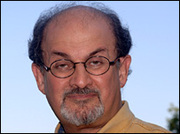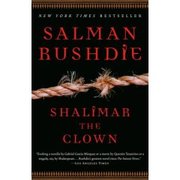Great writers live their stories. The greater the work the harder they have to live, inside. So Ernest Hemingway became a hunter, Scott Fitzgerald became a drunk, Mark Twain became a failed entrepreneur, and Salman Rushdie became a nomad.
I have long believed that Rushdie belongs in that sentence, deserves to dominate it, and he was based here in Atlanta, teaching a class at Emory University, when word came down that he had been given a knighthood by Queen Elizabeth. Thus, the Atlanta Knight.
Rushdie is a dark knight, indeed. He is the prose poet of the Indian tragedy, the terrible series of ethnic struggles following its independence. Gandhi was the smiling face of that independence, Rushdie the chronicler of its terrible, terrible price.
A Muslim in a Hindu country, an Indian in the British colonial
homeland, pursued by demons, only some of them imaginary, Rushdie has
produced some of the greatest work ever done in the English language. Midnight’s Children. The Satanic Verses. Haroun and the Sea of Stories. Shalimar the Clown. And more, much more.
Books so richly textured, so finely descriptive, that they defy the work of
mere moviemakers and thus have not even been attempted. To think that,
like Dr. Seuss, he got his start in advertising. Amazing he’s just 60. Yes, there is more to come.
Now, if the Nobel committee can just get its act together, we might
have a little justice in this world. No man I know of, in all the
world, is so deserving of the Nobel Prize in Literature as Salman Rushdie. He
has written at the heart of his time’s deepest conflicts, written not
just to the bone but inside it. No living writer comes close.
So arise, good sir knight. You’ve made a temporary neighbor very happy.
But I know it won’t give you the contentment you seek. Nothing can. No
woman, no drug, no vista, no honor can drive out the demons which
torment a great writer’s soul.
The price of greatness is a terrible price.












